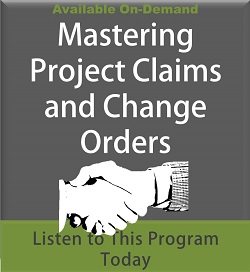Mastering Project Change Orders --
Getting it Right the First Time Download this four-part series that dissects the numerous complexities that lead to claims and change orders on construction projects. Attorneys and consultants presenting the sessions examine federal and private contract clauses that govern the ability to recover costs and time, including the roles and dynamics of the project staff and the owner's team. They shed light on solving the technical specification conflicts that typically cause claims. The series will help you understand various rights and remedies you might have to recover all costs and time related to the changes. Owners and contractors alike should have their teams sit in on these recorded sessions to be able to quickly resolve potential costly problems at the least expense to all parties. Session I Change Orders: The Bane of All Construction Projects Presented by: Stephen A. Hess, Sherman & Howard, LLC Very informative and well presented. Craig E. Yendell, P.E.
Veolia Excellent presentation providing clear interpretation of a complex topic. James Fuglaar
Dashiell Corporation |
Change orders are an integral part of every construction project, and when they are negotiated, drafted and executed as planned, they present no troubling legal problems. On the other hand, projects are completed with contract administration rules that address change order procedures ranging from substantial compliance at best to reckless indifference at worst. Yet even when changes in work are accomplished with little attention to formal change order procedures, there may be some lingering intuition that the contractor or subcontractor performing changed work should be permitted to compensation as a matter of fair play and equity. Of course, what constitutes “equity” depends on whose money is at stake in the battle over these “noncomplying change orders.” In this informative 90-minute recorded webinar program, Stephen A. Hess of Sherman & Howard, LLC presents an overview of the rights and responsibilities of the parties with respect to noncomplying change orders — changes in work that are accomplished without detailed attention to contractual procedures. Attend this program to: - Understand standard change order mechanisms utilized by construction agreements
- Discover when strict compliance with change order procedures may be excused
- Learn how different courts vary in their treatment of noncomplying change orders
- Find out what “prejudice” might be demonstrated as a defense to noncomplying change orders
- Identify specific protection parties can utilize against noncomplying change orders
- Apply contract administration techniques that enhance the enforceability of change order procedures
- And much, much more!
Session II Identification and Notification of Claims: Overcoming the First Obstacles to Successful Recovery Presented by: Joe McManus, McManus & Felsen, LLP Best Practices for Identification and Notification Changes are an inherent part of any construction project. Owner-directed changes are the most frequently encountered, with minor changes easily negotiated and incorporated into the project. There are many other changes encountered on a project that are less obvious, but can impact the cost and time of performance. The most successful contractors and owners are those that are adept at managing the claims and change order process, and most importantly, have a firm understanding of the Identification and Notification process. Joe McManus discusses the "hows and whys" of identifying claims and notifying the owner of all potential problems. This is one of the most important aspects of contract administration, as proper notification is paramount to avoid losing one's right to submit a claim as well as to establish the foundation for ultimate proof and recovery. This program will help you: - Understand what is a claim and the important elements each claim must have
- Learn why the Changes clause, the foundation of most change orders, is not always the road to recovery
- Develop a non-adversarial approach to identification and notification of potential claims
- Learn the prerequisites to identification: contract knowledge and construction law familiarity
- Interpret notice provisions — how to deal with conflicting contract provisions, late notice and notice shortcomings
- And much, much more!
Session III Contract Interpretation — Insight to the Myriad of Causes of Conflict Arising from the Drawings & Specifications Presented by: Brian Bennett, Bennett Legal Group Contract interpretation is one of the more interesting subjects in day-to-day project management. Every construction project is a unique design accompanied by a unique set of contract documents. Design is limited — or should we say "unlimited" — only by the imagination of the designer. So it is natural that the development of the specifications and drawings comprising the contract documents will give rise to questions and conflicts. Construction attorney Brian Bennett aptly dives into this fascinating topic, providing examples and methods developed over the years to help the contracting parties interpret contract documents and resolve disputed items. This important session will: - Introduce you to the rules of contract interpretation
- Examine defective specifications and their implications, including suitability of methods or material, possibility vs. practicality, cardinal changes and failure to disclose knowledge
- Help you understand the duty to seek clarification and the “zone of reasonableness” in determining the confidence level of your interpretation of contract clauses and drawings
- Review other duties and obligations of both the contractor and owner necessary to deal with discrepancies and the need for changes
- And much, much more!
Session IV Effective Construction Project Documentation Presented by: Scott Lowe, Principal, Trauner Consulting Services, Inc. This recorded session describes why good documentation is so important and why contemporaneous documentation created by the stakeholders during the life of a construction project is even more important. The various ways that construction projects are documented and preserved for posterity during the course of a construction project are described, and suggestions for making this documentation more fact-focused and effective are presented. It will be shown how effective communications and documentation can increase the likelihood of resolving issues in a timely manner and without resort to the claims or litigation process. Real-life examples of both effective and not-so-effective communications will be presented. This presenter covers the following types of project documents: pre-construction documentation, standard records (meeting minutes, logs, RFIs), testing and inspections, communications (emails, letters, schedules), how to document oral conversations, and tips for effective photographs and videos. We learned a lot, particularly regarding the fact that submittals and shop drawings are not considered part of the contract documents. John Kulp
Kulp's of Stratford Excellent information provided. Anonymous Participant |
This program will help you: - Identify when an event should be documented
- Recognize when a response to another’s documentation is required
- Draft an effective letter, memo, or email that is neutral in its tone, focused on facts, and omits editorial or inflammatory comments
- Create unbiased meeting minutes
- Complete daily reports that accurately recount what happened on the project
- Better understand the need for a filing system that is used by all and facilitates the retrieval of relevant facts
- And much, much more!
Who Will Benefit? Owners, contractors, subcontractors, construction managers, engineers and architects who are (or soon will be) working on construction agreements, drawings, specifications, and are overseeing construction sites should watch these informative programs. These programs will show you what you must document and what you should not, how best to deal with countless change orders and what is or what is not a part of contract documents.
*BONUS SESSION From Paper to Paperless: Controlling Construction Documentation, Improving Record Management and Identifying Risk in an Electronic Age Presented by: Matthew J. DeVries, Partner, Burr & Forman LLP, and Founder of www.bestpracticesconstructionlaw.com This session will show you what you must document and what you should not document to help you win in court! Learn best practices for documentation and record management in this 90-minute recorded presentation — From Paper to Paperless: Controlling Construction Documentation, Improving Record Management and Identifying Risk in an Electronic Age. This program will provide you with guidance to help you develop effective procedures for documenting your projects, including the transformation to the paperless project. You’ll get answers to your pressing questions about electronic evidence on a construction project, including the legal issues surrounding social media. This course will explore: - "Putting it in writing" rule — what should you record? What is the hearsay rule?
- Why are proper records so essential for claims and disputes?
- Critical project documentation – what you absolutely need to document; and non-critical documentation — what you don't need to document
- How to use project management software and Web-based capabilities to move towards a paperless project, establish a good audit trail and consolidate project documentation
- Are electronic documents subject to the same discovery rules as paper documents? Is a written instruction via e-mail the same as a change order?
- How do social media platforms (Twitter, Facebook, MySpace) affect your project? Do you need a social media policy for your employees?
- And much, much more!
| 





